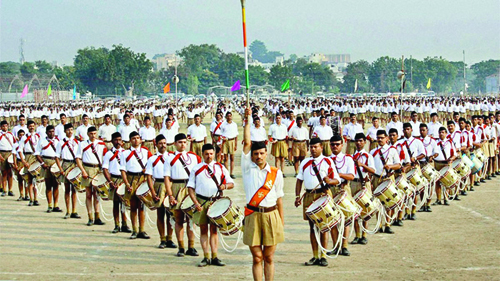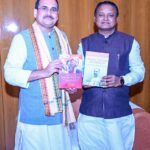The notion of ‘Bharatiyata’
- By : Anirban Ganguly
- Category : Articles

Comrade Brinda Karat of “Dum Dum Dawai” fame, like her comrades and other co-ideologues, has started pontificating on nation, nationalism, culture, and the RSS. A favourite pastime for fascists is to indulge in trying to delineate, describe, and articulate issues about which they know precious little. Such obfuscation helps in creating a false narrative that serves the purpose of propaganda, violent politics, and subversive acts. While the naxals and Maoists have mastered that art, their marginally refined version, the Indian communists, take regular recourse to that way. Read This – Say no to plastics! Comrade Brinda Karat understands precious little of the RSS and knows next to nothing about the communists’ pet personality of hate, Guruji M.S.Golwalkar. Gone are the days when you had the likes of EMS and AKG debating on points of ideology with stalwarts from the other side like P Parameshwaran, Nanaji Deshmukh, and Pandit Deendayal Upadhayay. The communists of today are thoroughly ignorant of the ideological positions of their ideological opponents. They thrive on reductionism and their self-professed intellectualism is held hostage and controlled by a set of “eminent” thinkers and historians, who have, over the years, poured the most acidic venom on Bharatiya culture, displayed scorn on those who have articulated its positive high-water marks, victimised those who have researched on these and gave rise to a class of intellectual lumpens whose only duty was to work for the communist parties while thriving on academic doles and institutional largesse. Read This – Reinvent India’s trade pattern It is these intellectual lumpens, all Stalin and Mao worshipping crypto-bourgeois, who have repeatedly disrupted the academic atmosphere of this country and given rise to a class which has exercised a Stalinist grip over the academia. West Bengal was one such laboratory where these methods were perfected. Thus, when these elements or their leaders talk of academic freedom and of how it is being “destroyed” under the RSS, one needs to dismiss these utterances as false propaganda. Unlike communists who have stagnated and are now dwindling, the RSS’ evolution, growth and spread has been societal, intellectual, and spiritual. The leaders of the RSS, past and present, have all of them undertaken a deep study and examination of society and their positions have always stemmed from that essential experience. With the evolution and dynamism of society and civilisation, their thoughts have also evolved. Working at the grassroots with a deep sense of service is the quintessential RSS way. Dubious ideology-obsessed and Politbureau-confined rootless “leaders” will scarcely understand such a motivating spirit. The comrades’ reading of the RSS and Golwalkar starts and ends with certain texts beyond which Golwalkar himself, and RSS eventually evolved. Intellectual and spiritual evolution in the Indian tradition is something that is welcome and natural. All our epochal thinkers, Sri Aurobindo, Swami Vivekananda, Gandhi, and others have always evolved their positions. Golwalkar falls in this league of thinkers – or as defined in the Hindu tradition – “drashta” – seer – with his articulations exuding a remarkable lucidness and clarity, demonstrating a deep penetration and perception of the Indian psyche and civilisational spirit. This gave Golwalkar certain clarity of vision, dignity of thought and prescience. For instance, as early as 1963, he predicted the disintegration of the USSR when he said, “it seems that either they will change, or they will stick adamantly to their ideology as they have been doing so far…There are chances that they will realise their mistake with experience, or else they may cease to exist…” His thoughts on our identity and nationality, for example, open a window into his intrinsic connect with the spirit of this land. A disciple of Swami Akhandananda, Golwalkar had imbibed and internalised this Indianness from his early years. Discussing the Western notion of nation and the Indian view of it, Golwalkar, for example, argued that a “society should not be a mere collection of human beings, or a grouping together of heterogeneous types of people in a particular place”, it had to “have a distinct lifestyle blended in certain ideals, culture, experiences, emotions, and traditions” and in this way “when people thus become united in common traditions and aspirations”, does the nation coalesce. Golwalkar saw such distinctness in India; he saw this emotion of the sacredness of the motherland bonding diversities, “this collective worship of the motherland”, he wrote, “by our entire society from Kashmir to Kanyakumari, from city-dwellers to forest-dwellers has established a bond of blood between its inhabitants. All these people, with their different methods of worship and different languages are a concrete manifestation of a great Hindu society which is the child of this motherland.” It was the ancestors of what, in modern times, has been known as ‘Hindu society’ who “created certain rituals and duties to keep alive the image of the living and indivisible motherland at its brightest in their minds.” It was this image upheld by the ideal of ‘Dharma’, perpetually re-invigorated by that life-force called ‘samskriti’ (culture) that has kept the Indian civilisational river flowing. For Golwalkar nationalism in the Indian context was not negative or predatory, “we have believed”, he pointed out, that it is not necessary to destroy the nation. All nations can live together as complementary entities to one another while keeping their own unique identities, recognise the beauty of commonality in their differences, and preserve and develop humanity…” Naturally, this Golwalkar does not suit some and makes him the object of hate especially for those whose ideological superstructure is based on the negation of Bharatiyata.

















